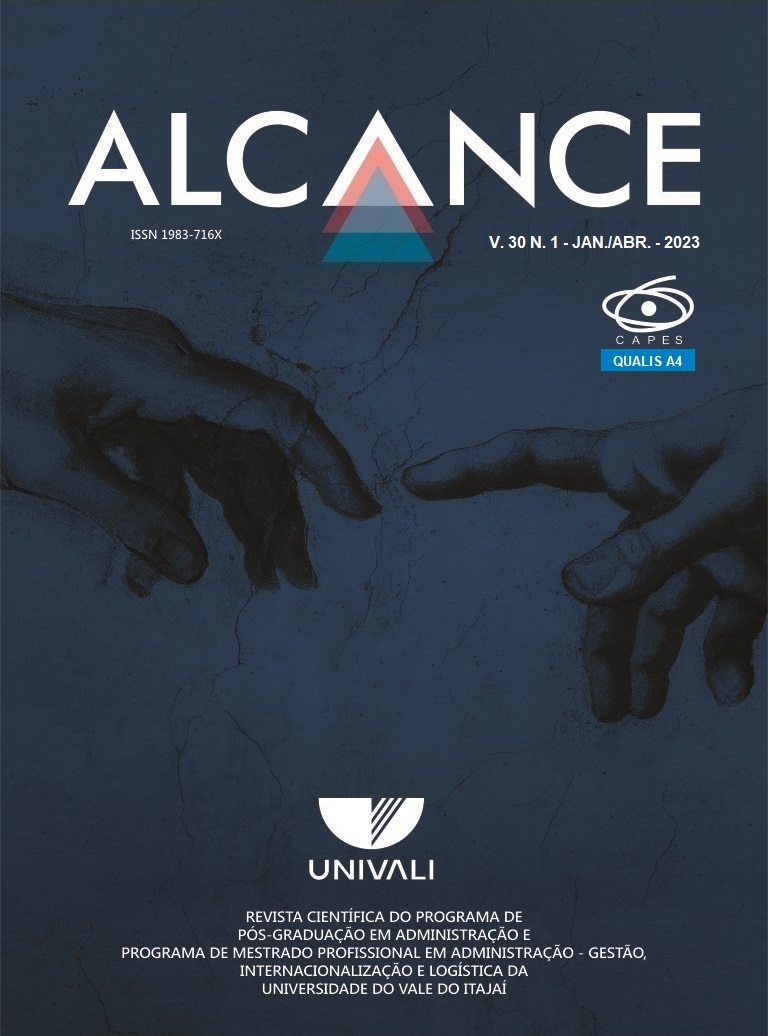EXAMINING THE ANTECEDENTS OF COCREATED SERVICE RECOVERY AND ITS RELATIONSHIP WITH CUSTOMER SATISFACTION
DOI:
https://doi.org/10.14210/alcance.v30n1(Jan/Abr).p33-52Keywords:
Initial Involvement, Satisfaction, Engagement, Attribution of FailureAbstract
Objective: This study aimed to investigate the impact of initial consumer involvement in service delivery and customer engagement on cocreated service recovery, and how this form of service failure resolution influences post-recovery customer satisfaction.
Design / Methodology / Approach: A descriptive research with a quantitative approach was conducted using a survey method, involving 189 Brazilian consumers from the hospitality sector. Data were analyzed using Structural Equation Modeling with Partial Least Squares (PLS) estimation.
Results: Findings demonstrate that recovery situations are not merely treatments for service process-related failures, but should be viewed as a social process wherein providers and consumers need to be engaged for mutual benefits. The results suggest that highly engaged customers who participate in the initial service delivery exhibit a greater willingness to collaborate in the recovery process.
Originality: This research investigates a typology of service failure recovery that is currently gaining popularity in studies on the subject. Additionally, it incorporates two antecedents of cocreated recovery that have been underexplored previously, especially in the Brazilian context, and that could provide pertinent information for effective failure resolutions.
References
Alotaibi, M. N., Chaouali, W., Mjahed Hammami, S., Schoefer, K., Aloui, N., & Abdulhamid Saleh, M. (2023). Is customer participation always good in service recovery? The moderating role of customers' positive psychological capital. International Journal of Bank Marketing, 41(3), 457-484.
Bagherzadeh, R., et al. (2020). The journey from customer participation in service failure to co-creation in service recovery. Journal of Retailing and Consumer Services, 54, 102058.
Balaji, M. S., et al. (2018). Are cynical customers satisfied differently? Role of negative inferred motive and customer participation in service recovery. Journal of Business Research, 86, 109-118.
Beaton, D. E., Bombardier, C., Guillemin, F., & Ferraz, M. B. (2000). Guidelines for the process of cross-cultural adaptation of self-report measures. Spine, 25(24), 3186-3191.
Behnam, M., et al. (2021). Exploring customer engagement in the product vs. service context. Journal of Retailing and Consumer Services, 60, 102456.
Betzing, J. H., Kurtz, M., & Becker, J. (2020). Customer participation in virtual communities for local high streets. Journal of Retailing and Consumer Services, 54, 102025.
Brodie, R. J., et al. (2011). Customer engagement: Conceptual domain, fundamental propositions, and implications for research. Journal of service research, 14(3), 252-271.
Boadi, A. E., He, Z., Bosompem, J., Opata, C. N., & Boadi, E. K. (2020). Employees’ perception of corporate social responsibility (CSR) and its effects on internal outcomes. The Service Industries Journal, 40(9-10), 611-632.
Boadi, E. A., He, Z., Antwi, C. O., Altab, H. M., Bosompem, J., Hinson, R. E., & Boadi, V. A. (2022). Value co-creation and employee service behaviours: The moderating role of trust in employee-hotel relationship. Journal of Retailing and Consumer Services, 66, 102898.
Bove, L. L., Pervan, S. J., Beatty, S. E., & Shiu, E. (2009). Service worker role in encouraging customer organizational citizenship behaviors. Journal of business research, 62(7), 698-705.
Chan, K. W., Yim, C. K., & Lam, S. S. (2010). Is customer participation in value creation a double-edged sword? Evidence from professional financial services across cultures. Journal of marketing, 74(3), 48-64.
Cheung, F. Y. M., & To, W. M. (2016). A customer-dominant logic on service recovery and customer satisfaction. Management Decision.
Cheung, M. F., & To, W. M. (2021). Effect of customer involvement on co-creation of services: A moderated mediation model. Journal of Retailing and Consumer Services, 63, 102660.
Choi, S., & Mattila, A. S. (2008). Perceived controllability and service expectations: Influences on customer reactions following service failure. Journal of Business Research, 61(1), 24-30.
Conduit, J., & Chen, T. (2017). Transcending and bridging co-creation and engagement: conceptual and empirical insights. Journal of Service Theory and Practice.
Dewarani, G., & Alversia, Y. (2023). The influence of customer involvement and engagement on co-creation of services, satisfaction, and loyalty: The case of Software as a Service. Innovative Marketing, 19(2), 27.
Dijkstra, T. K., & Henseler, J. (2015). Consistent and asymptotically normal PLS estimators for linear structural equations. Computational statistics & data analysis, 81, 10-23.
Dong, B., Evans, K. R., & Zou, S. (2008). The effects of customer participation in co-created service recovery. Journal of the academy of marketing science, 36(1), 123-137.
Fornell, C., & Larcker, D. F. (1981). Structural equation models with unobservable variables and measurement error: Algebra and statistics. Journal of Marketing Research, 18(3), 382-388.
Galvagno, M., & Dalli, D. (2014). Theory of value co-creation: a systematic literature review. Managing service quality.
Grégoire, Y., & Mattila, A. S. (2021). Service failure and recovery at the crossroads: recommendations to revitalize the field and its influence. Journal of Service Research, 24(3), 323-328.
Guo, L., et al. (2016). The role of perceived control in customer value cocreation and service recovery evaluation. Journal of Service Research, 19(1), 39-56.
Hair, Jr., J. F., Babin, B., Money, A., & Samouel, P. (2005). Fundamentos de métodos de pesquisa em administração. Bookman Companhia Ed.
Hair Jr., J. F., et al. (2014). Partial least squares structural equation modeling (PLS-SEM): An emerging tool in business research. European business review, 26(2), 106-121.
Hair Jr., J. F., et al. (2014). Fundamentos de pesquisa de marketing-3. AMGH Editora.
Hair, Jr., J. F., et al. (2019). When to use and how to report the results of PLS-SEM. European business review, 31(1), 2-24.
Haumann, T., et al. (2015). Engaging customers in coproduction processes: How value-enhancing and intensity-reducing communication strategies mitigate the negative effects of coproduction intensity. Journal of Marketing, 79(6), 17-33.
Hazée, S., Van Vaerenbergh, Y., & Armirotto, V. (2017). Co-creating service recovery after service failure: The role of brand equity. Journal of Business Research, 74, 101-109.
Heidenreich, S., Wittkowski, K., Handrich, M., & Falk, T. (2015). The dark side of customer co-creation: exploring the consequences of failed co-created services. Journal of the Academy of Marketing Science, 43(3), 279-296.
Henseler, J. et al. (2014). Common Beliefs and Reality about Partial Least Squares: Comments on Rönkkö & Evermann (2013), Organizational Research Methods, 17(2): 182-209.
Hoffman, K. D., & Kelley, S. W. (2000). Perceived justice needs and recovery evaluation: a contingency approach. European Journal of marketing.
Hollebeek, L. D., Glynn, M. S., & Brodie, R. J. (2014). Consumer brand engagement in social media: Conceptualization, scale development and validation. Journal of interactive marketing, 28(2), 149-165.
Jaakkola, E., & Alexander, M. (2014). The role of customer engagement behavior in value co-creation: a service system perspective. Journal of service research, 17(3), 247-261.
Jin, D., DiPietro, R. B., & Fan, A. (2020). The impact of customer controllability and service recovery type on customer satisfaction and consequent behavior intentions. Journal of Hospitality Marketing & Management, 29(1), 65-87.
Koc, E. (2019). Service failures and recovery in hospitality and tourism: A review of literature and recommendations for future research. Journal of Hospitality Marketing & Management, 28(5), 513-537.
Köcher, S., & Paluch, S. (2019). “My bad”: investigating service failure effects in self-service and full-service settings. Journal of Services Marketing, 33(2), 181-191.
Lee, M. J., Singh, N., & Chan, E. S. (2011). Service failures and recovery actions in the hotel industry: A text-mining approach. Journal of Vacation Marketing, 17(3), 197-207.
Luong, A. (2007). Gender and the underexpression of friendliness in the service context. Journal of Management & Organization, 13(2), 102-113.
Marketing Science Institute (2010). 2010–2012 MSI Research Priorities. Recuperado de: http://www.msi.org/pdf/MSI_RP10-12.pdf.
Nangpiire, C., Silva, J., & Alves, H. (2022). Customer engagement and value co-creation/destruction: The internal fostering and hindering factors and actors in the tourist/hotel experience. Journal of Research in Interactive Marketing, 16(2), 173-188.
Park, J., & Ha, S. (2022). Collaboration in Service Recovery: Control, Effort, and Self-Serving Bias. Services Marketing Quarterly, 43(1), 87-109.
Rather, R. A., Hollebeek, L. D., & Rasoolimanesh, S. M. (2022). First-time versus repeat tourism customer engagement, experience, and value cocreation: An empirical investigation. Journal of Travel Research, 61(3), 549-564.
Roggeveen, A. L., Tsiros, M., & Grewal, D. (2012). Understanding the co-creation effect: when does collaborating with customers provide a lift to service recovery?. Journal of the Academy of Marketing Science, 40(6), 771-790.
Samala, N., & Katkam, B. S. (2020). Fashion brands are engaging the millennials: a moderated-mediation model of customer-brand engagement, participation, and involvement. Young Consumers, 21(2), 233-253.
Santos, C. P. D., & Fernandes, D. V. D. H. (2008). A recuperação de serviços como ferramenta de relacionamento e seu impacto na confiança e lealdade dos clientes. Revista de administração de empresas, 48(1), 10-24.
Shams, G., et al. (2020). Hospitality-based service recovery, outcome favourability, satisfaction with service recovery and consequent customer loyalty: an empirical analysis. International Journal of Culture, Tourism and Hospitality Research.
Shoukat, M. H., & Ramkissoon, H. (2022). Customer delight, engagement, experience, value co-creation, place identity, and revisit intention: a new conceptual framework. Journal of Hospitality Marketing & Management, 31(6), 757-775.
Sidhu, S. K., Ong, F. S., & Balaji, M. S. (2023). Impact of failure severity levels on satisfaction and behavior: from the perspectives of justice theory and regulatory focus theory. Journal of Consumer Marketing, 40(4), 535-547.
Skourtis, G., et al. (2019). Does the Co‐Creation of Service Recovery Create Value for Customers? The Underlying Mechanism of Motivation and the Role of Operant Resources. European Management Review, 16(4), 997-1013.
So, K. K. F., King, C., & Sparks, B. (2014). Customer engagement with tourism brands: Scale development and validation. Journal of Hospitality & Tourism Research, 38(3), 304-329.
Sugathan, P., & Ranjan, K. R. (2020). When co-production fails: The role of customer’s internal attributions and impression management concerns. Journal of Business Research, 121, 535-548.
Sugathan, P., Ranjan, K. R., & Mulky, A. G. (2017). Atypical shifts post-failure: Influence of co-creation on attribution and future motivation to co-create. Journal of Interactive Marketing, 38, 64-81.
Van Vaerenbergh, Y. et al. (2019). The service recovery journey: Conceptualization, integration, and directions for future research. Journal of Service Research, 22(2), 103-119.
Van Vaerenbergh, Y., Hazée, S., & Costers, A. (2018). Customer participation in service recovery: A meta-analysis. Marketing Letters, 29(4), 465-483.
Vargo, S. L., & Lusch, R. F. (2004). Evolving to a new dominant logic for marketing. Journal of marketing, 68(1), 1-17.
Wei, S., Ang, T., & Anaza, N. A. (2019). Recovering co-created service failures: the missing link of perceived justice and ethicalness. Journal of Services Marketing.
Weiner, B. (1985). An attributional theory of achievement motivation and emotion. Psychological review, 92(4), 548.
Xu, Y. et al. (2014). Show you care: initiating co-creation in service recovery. Journal of Service Management.
Yi, H. T., Yeo, C., Amenuvor, F. E., & Boateng, H. (2021). Examining the relationship between customer bonding, customer participation, and customer satisfaction. Journal of Retailing and Consumer Services, 62, 102598.
Zhang, Y., & Shao, B. (2018). The effect of customer participation types on online recovery satisfaction: a mental accounting perspective. Future Internet, 10(10), 97.
Zhang, Y., Yuan, Y., & Shao, B. (2022). Co-creating value with customers in online service recovery: Bridging the links between mandatory and voluntary customer participation. Electronic Commerce Research and Applications, 55, 101188.
Downloads
Published
Issue
Section
License

This work is licensed under a Creative Commons Attribution 4.0 International License.
In this statement of responsibility, I/we certify that I/we participated in the preparation of the attached article, thus making my/our responsibility for its content public. I/we declare that we have not omitted any links or financing agreements between me/us and entities and/or institutions that may have an interest in the publication of this article. I/we certify that the article is original and the work, either in total or in part, or any other work of my/our authorship with substantially similar content, has not been nor will be sent in any format (printed or electronic) to another periodical while its publication is being considered by Revista Alcance. In this consent form, the associated authors give permission to Revista Alcance, in the case of approval by its Editorial Board, to publish the attached article in electronic copy in a regular edition of the journal and to load it to the database.

